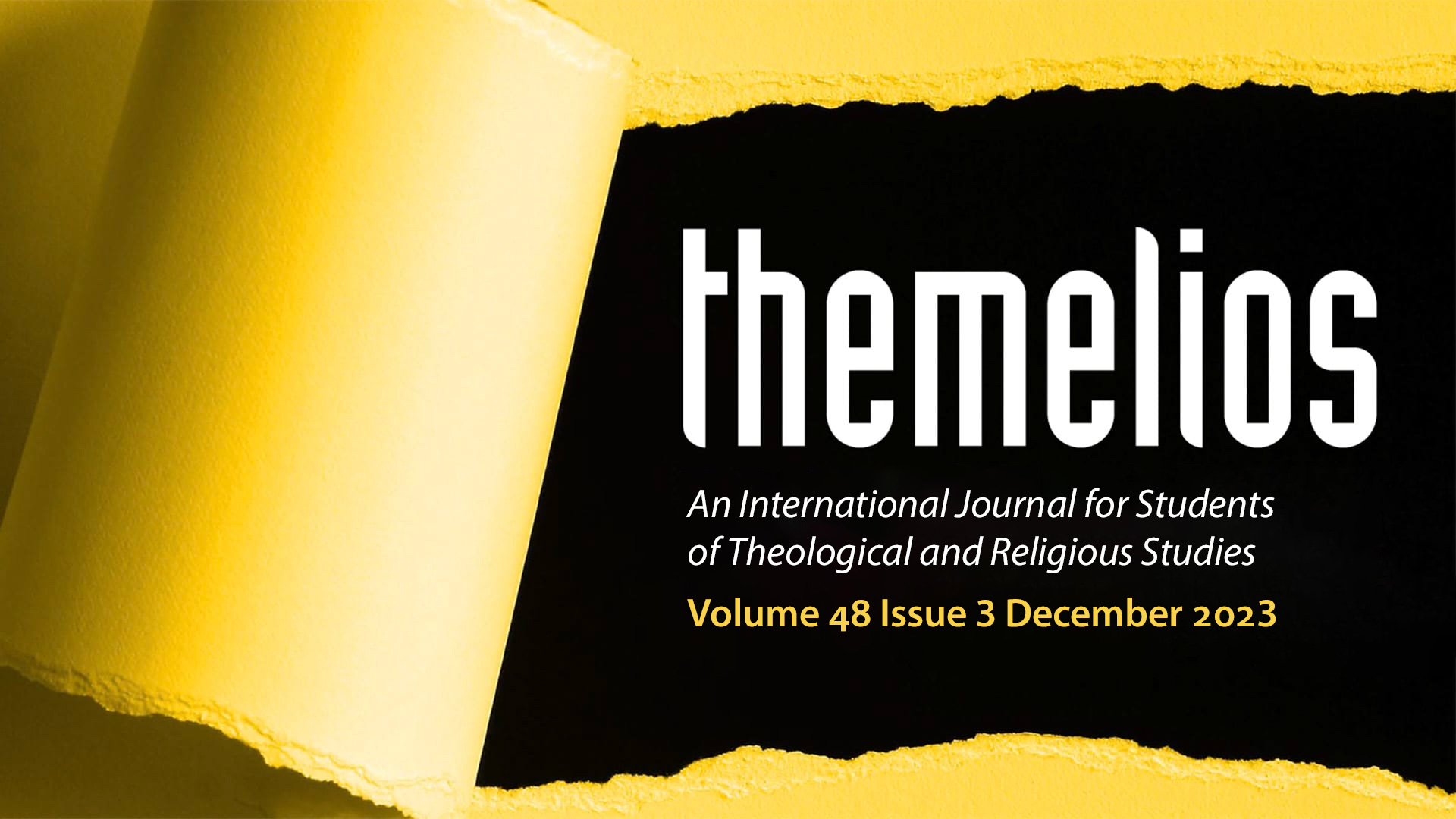
www.thegospelcoalition.org
Themelios 48.3
The new December 2023 issue of Themelios has 240 pages of editorials‚ articles‚ and book reviews. It is freely available in three formats: (1) PDF‚ (2) web version‚ and (3) Logos Bible Software.
1. Brian J. Tabb | Dealing with Criticism: Lessons from Nehemiah
This column reflects on how Nehemiah responds to criticism and opposition and considers lessons that ministry leaders today may glean from Nehemiah’s example.
2. Daniel Strange | Strange Times: Skin in the Game?
Strange reflects on his heritage and on challenging contemporary dialogues about race and ethnicity. He cautions against privileging the ministerial authority of experience over the magisterial authority of Scripture and urges readers to ground their identity in Christ and resolve with each other to interpret the world through the Word and build on that solid themelios (foundation).
3. Andreas J. Köstenberger | Geerhardus Vos: His Biblical-Theological Method and a Biblical Theology of Gender
This article seeks to construct a biblical theology of gender based on Geerhardus Vos’s magisterial Biblical Theology. Köstenberger sets forth five hallmarks of Vos’s method: (1) putting God first‚ (2) focusing on the text‚ (3) viewing Scripture as progressive divine revelation‚ (4) displaying a historical orientation‚ and (5) believing in the practical utility of biblical theology. He then develops a biblical theology of gender as Vos might have developed it in keeping with the four major scriptural movements of creation‚ fall‚ redemption‚ and consummation.
4. David V. Christensen | The Lamblike Servant: The Function of John’s Use of the OT for Understanding Jesus’s Death
Christensen argues that John provides a window into the mechanics of how Jesus’s death saves‚ and this window is his use of the Old Testament. When interpreters look through this window and ask how John understands Jesus’s death‚ our eyes see—by the passages John chose—substitutionary atonement as essential to the inner mechanism of how Jesus’s death saves.
5. G. K. Beale | The Greco-Roman Background to “Fighting the Good Fight” in the Pastoral Epistles and the Spiritual Life of the Christian
What does Paul mean by the expression “fight the fight” in 1 Timothy 1:18 (NASB)? Beale explains that the Greek verb στÏατεύω with the noun στÏατεία can be also rendered “battle the battle” or‚ more generally‚ “perform military service” or “serve in a military campaign.” This expression occurs often in Greco-Roman literature as a patriotic warfare idiom for good character revealed by persevering through warfare or military campaigns. It also occurs in legal contexts to affirm someone’s innocence and good reputation before the court. This idiom is applied to Timothy to demonstrate his good Christian character and reputation over against the false teachers’ bad character.
6. Jeremy Sexton | Postmillennialism: A Biblical Critique
Postmillennialism had been pronounced dead when R. J. Rushdoony and his fellow Reconstructionists resuscitated it in 1977 with stimulating though nonexegetical publications. In the following decades‚ many in Rushdoony’s train added innovative biblical arguments whose interpretive methods don’t withstand scrutiny. Sexton examines the hermeneutical idiosyncrasies and exegetical fallacies displayed in defenses of postmillennialism by Greg Bahnsen‚ Kenneth Gentry‚ David Chilton‚ Keith Mathison‚ Douglas Wilson‚ and others. Postmillennialists routinely keep textual details out of focus or interpret them tendentiously‚ in service of the belief that the prophecies of worldwide righteousness and shalom will reach fulfillment on earth before rather than at the second coming.
7. Jason G. Duesing | Beacons from the Spire: Evangelical Theology and History in Oxford’s University Church
Thought to be the most visited church in England‚ the University Church of St Mary the Virgin in Oxford has hosted‚ from its pulpit‚ noteworthy figures of English church history. Duesing applies the metaphor of a signal beacon to trace the development of evangelical history and theology by examining significant sermons preached in St Mary’s by Thomas Cranmer in the 16th century‚ John Owen in the 17th century‚ John Wesley in the 18th century‚ the evangelical response to the Anglo-Catholics in the 19th century‚ and C. S. Lewis in the 20th century.
8. N. Gray Sutanto | Cultural Mandate and the Image of God: Human Vocation Under Creation‚ Fall‚ and Redemption
While the term “cultural mandate” is well recognized as a way of understanding the relationship between Christianity‚ culture‚ and human vocation‚ its origins from within the Dutch neo-Calvinist tradition are less known. Drawing from this tradition‚ then‚ Sutanto sketches the logic of a neo-Calvinistic account of the cultural mandate through the states of creation‚ fall‚ and redemption.
9. John Jefferson Davis | Is the One God of the Old Testament and Judaism Exactly the Same God as the Trinitarian God—Father‚ Son‚ and Holy Spirit—of the New Testament and Christian Creeds?
This article argues that the One God of the Old Testament and Judaism is exactly the same God as the Trinitarian God of the New Testament and Christian creeds. Davis presents new arguments supporting the unity and coherence of Old and New Testament revelation‚ employing (1) new analogies from modern physics and (2) new philosophical insights concerning the properties of objects nested in a larger whole and how those objects are to be properly counted in relation to the larger whole.
10. Gary J. Cundill | Do Companies Have Social Responsibilities?
Business and Christianity don’t always enjoy the most comfortable of relationships. One approach Christians have taken when considering business’s place in the world is to describe it in terms of corporate responsibility—that business has a responsibility not merely to deliver financial returns but to offer broader societal benefits. Cundill surveys the biblical evidence for such a view and finds it unconvincing. Rather‚ it’s evident that Christians‚ not businesses‚ have social responsibilities and can and should discharge these in the world of business.
11. Jonathan D. Christman | A Biblical Framework for Deciding Workplace Moments of Conscience
A well-known Christian intellectual and cultural commentator‚ John Stonestreet‚ has often publicly spoken of the need for Christians to develop a theology of “getting fired.” This call isn’t one for a mass exodus of Christians from the workplace. Rather‚ this call recognizes that more and more Christians are facing moments of conscience in their workplaces‚ when the obligations of a job—one’s current calling or vocation—come into conflict with one’s beliefs or convictions. Grounding both calling and convictions in Scripture‚ Christman proposes an overarching framework and practical guide for analyzing‚ assessing‚ navigating‚ and deciding those workplace moments of conscience. Doing so entails both individual and corporate dimensions that are grounded in wisdom‚ humility‚ the means of grace‚ and life-giving community in the body of Christ.
12. Robert P. Menzies | Pentecost: Not Really Our Story After All? A Reply to Ekaputra Tupamahu
Menzies responds to Tupamahu’s post-colonial critique of the Pentecostal reading of Acts and the missionary enterprise. According to Tupamahu‚ the disciples are marginalized Galileans who move from the periphery to the center of the Roman world. Thus‚ white American Pentecostals need to rethink their vision of the expansionist mission. Menzies argues that Tupamahu’s racially colored‚ post-colonial reading of Acts distorts Luke’s intended meaning‚ reflects a diminished view of the gospel‚ and betrays the legacy of Pentecostal leaders like William Seymour. In Acts‚ the disciples are commissioned by Jesus (Luke 24:46–49; Acts 1:4–8). Their mission centers on the Spirit-inspired proclamation of the gospel. Luke emphasizes that their mission is our mission (Luke 10:1–16; Acts 2:17–18). Thus to reject our mission is to repudiate the significance of our message and to resist the leading of the Spirit.
Featured Book Reviews:
Dominick S. Hernández‚ Engaging the Old Testament: How to Read Biblical Narrative‚ Poetry‚ and Prophecy Well. Reviewed by Douglas R. Fyfe.
Craig S. Keener‚ Christobiography: Memory‚ History‚ and the Reliability of the Gospels. Reviewed by Michael B. Metts.
Collin Hansen‚ Timothy Keller: His Spiritual and Intellectual Formation. Reviewed by Caleb Morell.
Daniel G. Hummel‚ The Rise and Fall of Dispensationalism: How the Evangelical Battle over the End Times Shaped a Nation. Reviewed by Kenneth J. Stewart.
Matthew Barrett‚ Simply Trinity: The Unmanipulated Father‚ Son‚ and Spirit. Reviewed by Karl Deenick.
Christopher Watkin‚ Biblical Critical Theory: How the Bible’s Unfolding Story Makes Sense of Modern Life and Culture. Reviewed by Carl R. Trueman.
Derek Brotherson‚ Contextualization or Syncretism? The Use of Other-Faith Worship Forms in the Bible and in Insider Movements. Reviewed by Matthew Bennett.

















